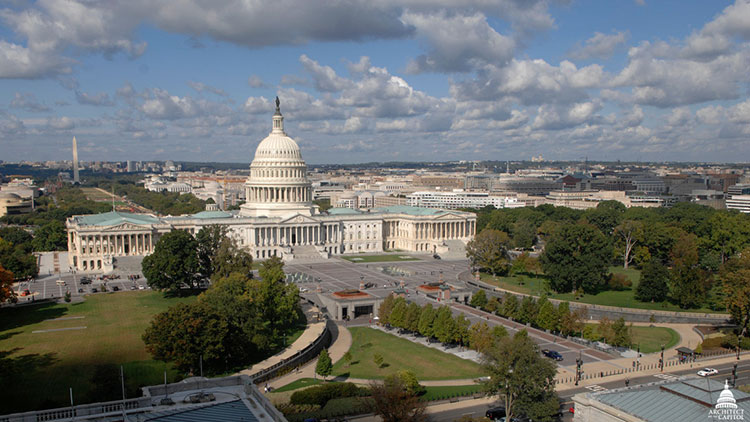Senate Votes to Restore Net Neutrality Rules

The smarter way to stay on top of broadcasting and cable industry. Sign up below
You are now subscribed
Your newsletter sign-up was successful
With the help of three Republicans, the Senate has voted by a slim margin to nullify the FCC's effort to deregulate internet access, but it still faces an up-Hill battle that most observers believe will ultimately not be won.
The vote on the Congressional Review Act (CRA) joint resolution (SJ Res. 52) was 52 in favor. The "ayes" included the votes of all 47 Democrats, two independents who caucus with them and moderate Republicans Susan Collins (R-Me.), John Kennedy (R-La.), and Lisa Murkowski (R-Alaska).
Once Kennedy's vote was cast--he had been one of the swing votes--passage appeared certain.
The FCC voted Dec. 14 to eliminate the rules against blocking, throttling and paid prioritization. The rollback takes effect June 11 unless it is nullified by Congress.
But the CRA, a way for Congress to reverse agency decisions, now heads to the House, where it would need to secure more Democratic votes (it had 160 at last Democratic count) plus a couple dozen Republican votes, which is highly unlikely.
Then it would need to be signed by a President who has publicly supported the reg rollback.
Sen. John Thune (R-S.D.) said, flatly, during floor debate that the CRA would not ultimately succeed, calling it a dead end, and Sen. Roger Wicker (R-Miss.) said if it passed the Senate, it was "a statement," but no more.
The smarter way to stay on top of broadcasting and cable industry. Sign up below
Related: ISPs on Net Neutrality CRA: No Way
The Senate vote does give oxygen to net neutrality activists as they try to sway moderate House Republicans to their side, or alternatively use legislators' lack of support for the CRA against them in the midterm elections.
But Republicans argue that oxygen reduces the chances for the kind of bipartisan legislation they say is needed to provide regulatory certainty.
Democrats counter the legislative offering is a delay tactic rather than a good faith effort.
Sen. Thune, in advance of the vote, offered up a draft of such a bill that would prevent blocking, throttling and paid prioritization, but since he called for introducing it under unanimous consent, which almost certainly wasn't going to happen--CRA sponsor Sen. Ed Markey (D-Mass.) was quick to object to it as problematic and unripe for discussion--it was mostly about making his point.
He reiterated his support just before the vote, as well as his conviction the CRA was a charade and the vote was a distraction from that legislative effort.
Separately, critics of the FCC's deregulation have taken the commission to court and Sen. Richard Blumenthal (D-Conn.) said Wednesday that even if the CRA does ultimately fail, that legal challenge to the Restoring Internet Freedom order will not.
"The House must do its part and advance [the] resolution," said House Democratic Leader Nancy Pelosi (D-Calif.) in a press conference following the Senate vote. Pelosi asked for an immediate vote on the CRA so the Dems can get Republicans on the record for or against.
Whether and when the House speaker will do so remains an open question.
Rep. Mike Doyle (D-Pa.), who is motormanning the CRA in the House, said he was launching a discharge petition so CRA backers could force a House vote , as Dems did in the Senate.
For now, computer companies were celebrating the victory, though they are in D.C.'s sites for some internet regulation of their own in the wake of Russian election meddling, privacy protection concerns and fake news.
“With such consensus among internet users, businesses, public interest groups on the need for an open internet, it is appalling the agency that was supposed to protect consumers decided not to do so," said Computer & Communications Industry Association President Ed Black. "We all owe a debt of gratitude to Senators today for recognizing what a serious misstep the FCC has taken --- and doing all they can to stop it. We urge the House to follow the Senate’s action.” CCIA members include Facebook, Amazon, Google and Netflix.
ISP deregulation fans were not happy.
“Today’s vote was driven by political double-speak designed to win mid-term election votes," said Fred Campbell of Techknowledge. "The net neutrality rules the CRA is intended to restore were designed to protect the special interests of big tech monopolies, not protect consumers."
“The Internet Innovation Alliance supports an open internet," said the group. "Unfortunately, today’s vote in the Senate does not advance it. Nor will the Senate action enhance consumers’ privacy online, promote additional protections for America’s consumers or get us out of the hyper-political, excessively-partisan maneuvering that has taken far too much time, energy, and resources away from advancing broadband across America."
Related: High Noon for Net Neutrality CRA
“The best way forward is clear. Congress can enact, this year, a bipartisan bill to further an open internet based on clear principles to which everyone should agree: No blocking of legitimate online content; no throttling based on content; no censorship or unfair discrimination based on content; and a robust privacy regime equally applicable to everyone in the internet ecosystem, enforced by the expert consumer protection agency, the FTC. These principles are clear, simple, and the foundation of a truly open internet," said the alliance.
Contributing editor John Eggerton has been an editor and/or writer on media regulation, legislation and policy for over four decades, including covering the FCC, FTC, Congress, the major media trade associations, and the federal courts. In addition to Multichannel News and Broadcasting + Cable, his work has appeared in Radio World, TV Technology, TV Fax, This Week in Consumer Electronics, Variety and the Encyclopedia Britannica.

